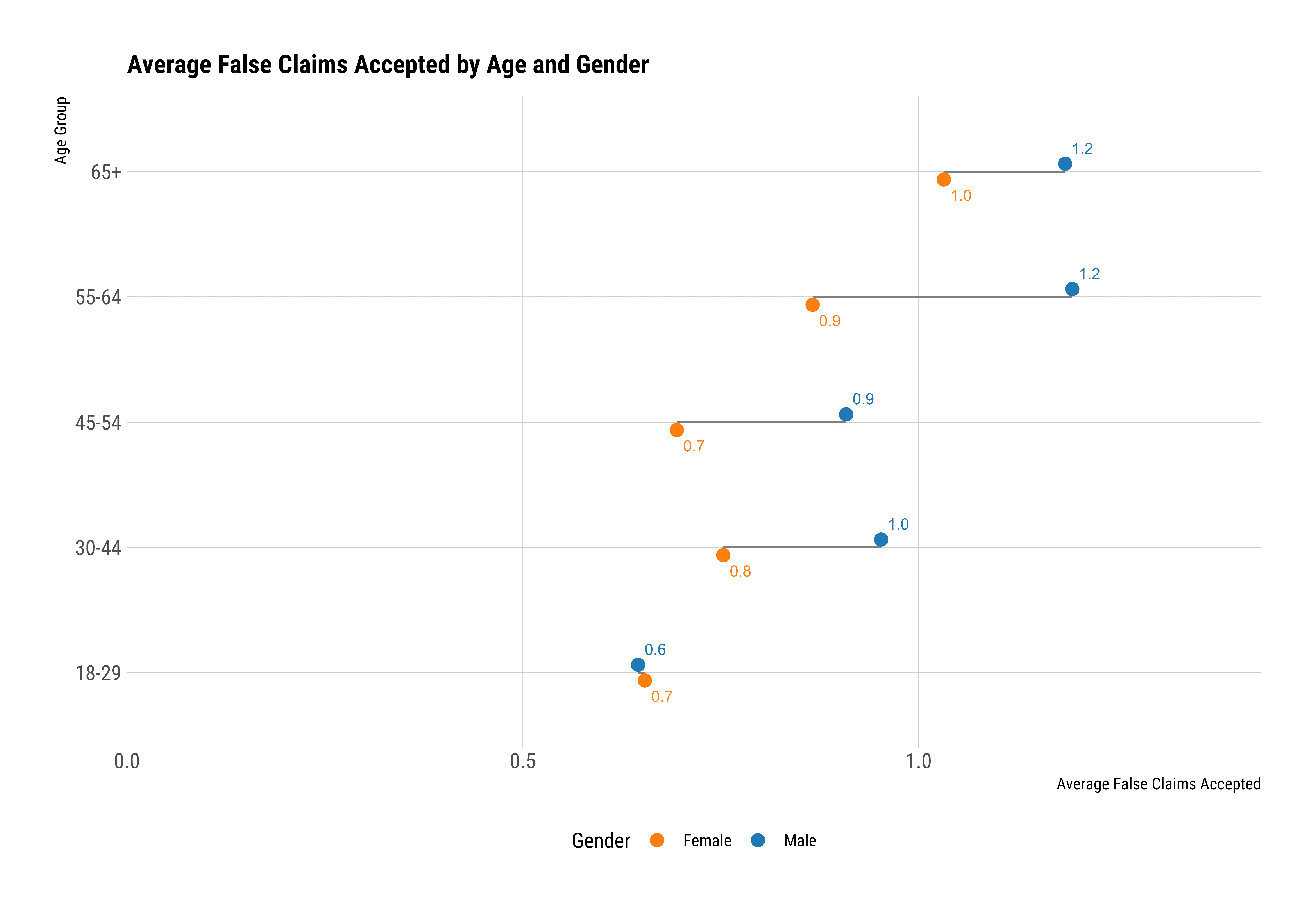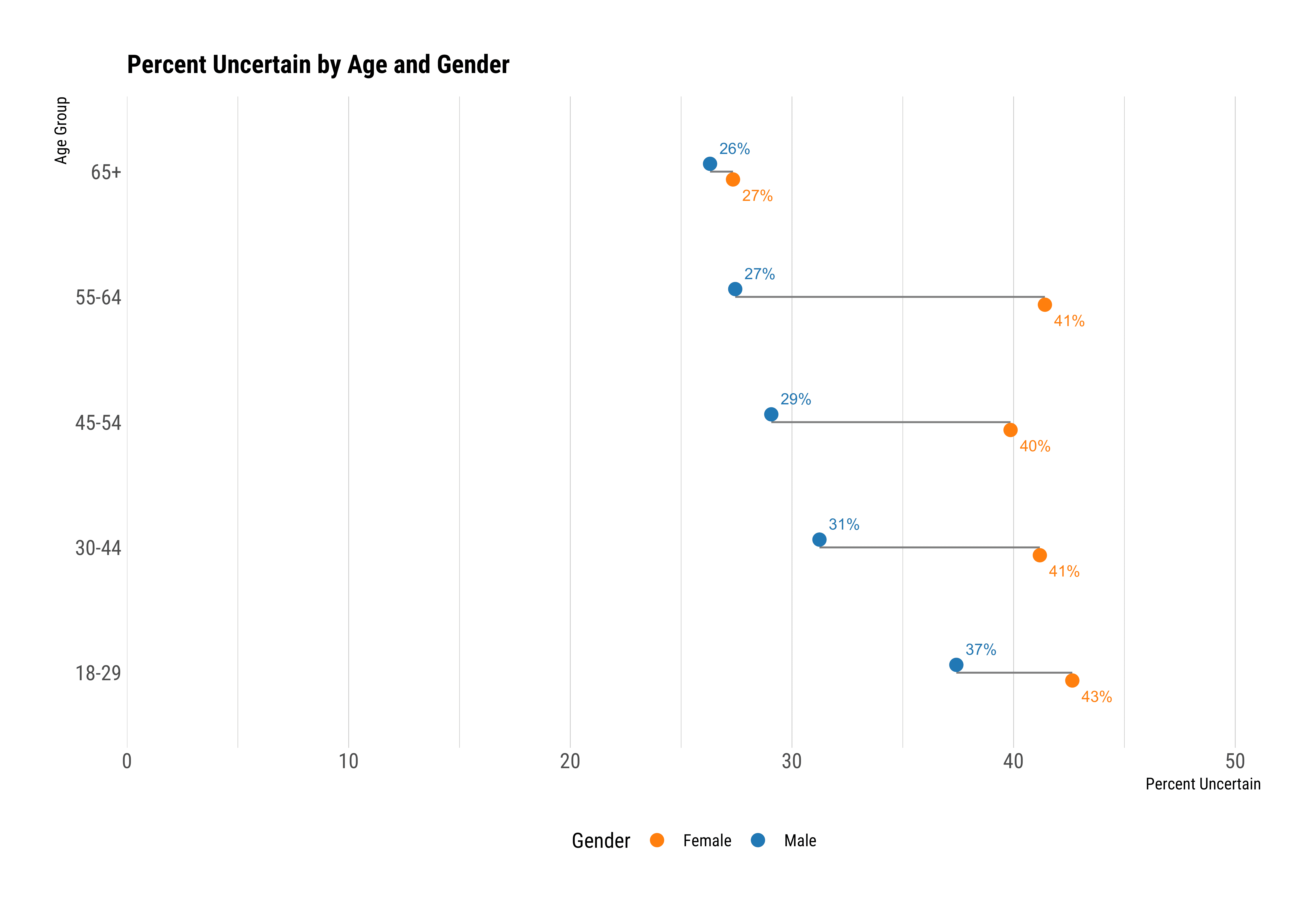Findings from DDIA poll of 3,000 Latinos conducted in September 2024, the full findings of which were released in February 2025.
TAKEAWAYS: Latinos & Misinformation
The Digital Democracy Institute of the Americas (DDIA) partnered with YouGov to conduct a nationally representative poll of 3,000 U.S. Latino adults, from September 6 to September 30, 2024, in English and Spanish.
The poll explored the five key topics below. This document outlines takeaways from the highlighted areas:
Familiarity and belief in a series of misinformation narratives and claims, including over time.
Changes in levels of trust in elections, and efficacy and vote intention since the primaries.
Agreement with new election-specific claims about Kamala Harris and Donald Trump.
Sentiments around immigration-related topics.
Updated views on generative-AI technologies and regulation.
How Much Are Latinos Engaging with Misinformation Online?
Latinos see a lot of misinformation, but are also very skeptical of what they see.
The majority of Latinos are still not subscribing to misinformation – a significant number expressed high levels of skepticism regarding the veracity of various claims, both a positive sign of critical thinking and a negative consequence of distrust that comes with rampant pollution on the Internet.
In this September poll, 66% of Latinos in our sample either outright reject false claims or express uncertainty about them.
In our March/April poll, 62% of participants in our sample either outright reject false claims or express uncertainty about them.
Which Conspiratorial Narratives Do U.S. Latinos See and Believe the Most?
Broader misleading and conspiratorial narratives about elites and the state of the world are prevalent and have high acceptance among those who have been exposed to them.
The most accepted narratives among exposed Latinos were:
Corporations controlling politics (47%)
Elites censoring truth (46%)
Other narratives also received notable levels of acceptance, including:
A leftist agenda in schools (41%)
Russia controlling the US (38%)
The existence of a Deep State (36%)
Democrats committing election fraud (35%)
Even with these broader narratives, uncertainty remains high.
For several claims - including Russia controlling the US, vaccines being used for population control, elites censoring the truth, the existence of a Deep State, and corporations controlling politics - over 40% of exposed Latinos expressed uncertainty about their validity. This underscores the prevalence of doubt even when confronted with these more general narrative claims.
Which False Claims Do U.S. Latinos See and Believe the Most?
Our analysis of beliefs among exposed Latinos reveals significant variation across different claims. The claim with the highest acceptance rate is that Trump was on Epstein’s list, with 58% of exposed Latinos accepting it.
Several other claims also received relatively high levels of acceptance among the exposed, including:
Putin supporting Hamas (42%)
Polls being manipulated (42%)
Democrats leaving the border open to let in undocumented migrants to vote for them (40%)
Harris misrepresenting her race (39%)
Covid vaccine producing health issues (37%)
For 7 out of the 16 claims, uncertainty was the most common response.
Moreover, for claims such as January 6 being a false flag operation, Harris being a communist, and vaccines causing autism, rejection was the most prevalent response.
How Do Demographics Correlate with the Extent to Which Latinos Are Seeing and Believing Misinformation?
Age differences in misinformation acceptance are often larger than gender differences.
Among Latino men, 25% of those aged 18–29 fall into misinformation-adopting subgroups, compared to 45% of those aged 65+ — a 20-point difference.
Among Latina women, 28% of those aged 18–29 fall into misinformation-adopting subgroups, compared to 39% of those aged 65+ — an 11-point difference.
Women are generally more uncertain than men across age groups.


APPENDIX
Claims - defined as a statement or assertion, often with no proof - tested:
DDIA tested Latinos’ familiarity and belief in 16 specific false claims in September. Nine of these claims were carried over from the initial poll conducted in March/April 2024, including:
1. January 6 was a false flag operation orchestrated by the U.S. federal government and law enforcement.
2. Democrats are failing to secure the U.S. southern border in order to allow undocumented immigrants to vote for them in U.S. elections.
3. COVID-19 vaccines can lead to more serious health issues like myocarditis and infertility that would otherwise not be observed among those who catch COVID-19.
4. Giving kids vaccines can cause autism.
5. Putin warned the U.S. to stay away from the “Israel-Hamas” war.
6. The United Nations has proposed the adoption of Global Coin, a digital currency that will unify all existing currencies.
7. The Department of Education is planning to make an online activism course mandatory for students nationwide.
8. Amazon delivery drones will be supplied by the U.S. military.
9. The U.S. government is planning on selling Alaska back to Russia to pay off the national debt.
The new claims were chosen for their relevance to the 2024 election, particularly in light of events such as the Trump assassination attempt and Kamala Harris becoming the Democratic candidate.
These included:
1. Kamala Harris is a communist
2. Kamala Harris misrepresents herself as African-American
3. Republicans orchestrated the Trump assassination attempt to increase Trump’s popularity
4. The U.S. orchestrated the war in Gaza
5. Donald Trump was named on the “Epstein List” that was released
6. Artificial intelligence technologies like ChatGPT are conscious and have feelings
7. Polls are being manipulated to distort public opinion
Narratives - defined as an account of connected events; a story - tested:
We also tested familiarity and belief in eight conspiratorial narratives. They were the following:
1. Democrats have won elections by resorting to fraud and electoral manipulation
2. Vaccines are a form of population control supported by elites and large corporations
3. There is a Deep State composed of shadowy political figures that is working against the public
4. Traditional values are being eroded by a leftist political agenda that is being implemented in schools
5. Russia is controlling American politics by undermining our elections and causing rifts between Americans
6. Corporations are all-powerful in American politics, with little room for the public to make a difference
7. Elites are plotting with mainstream media outlets and social media companies to censor the truth
8. Immigrants are destroying the American way of life
Download